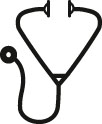Abstract

Introduction: Telomere biology disorders (TBD) comprise a group of hereditary disorders characterized by a genetically determined insufficiency of telomere maintenance leading to fibrosis and malfunction, especially of bone marrow (BM), liver, and lungs. TBD can present with highly variable phenotype as so-called "cryptic" forms with only mild clinical manifestations. Known genetic causes include defects in genes encoding mainly for proteins directly involved in telomere biology. However, today, still a relevant subgroup of patients with the clinical picture of TBD remain without a molecular diagnosis. Recently, members of yet a single family carrying a dominantly inherited missense variant in MDM4 (NM_002393.5:c.1361C>T, p.(Thr454Met)) with premature telomere length (TL) shortening were reported (Toufektchan et al., 2020) presenting with a phenotype similar to the classical TBD, Dyskeratosis congenita. The MDM4-gene encodes a 490-amino acid protein that interacts with and negatively regulates p53. In vitro and murine studies suggested a loss of p53 regulation by the defective MDM4 protein leading to augmented p53 activity and insufficient telomere maintenance. In line with this finding, mice with an overactive TRP53 developed BM failure and lung fibrosis resembling the phenotype of TBD.
Here, we report three patients from different families carrying germline variants in MDM4 presenting with a TBD phenotype of varying severity.
Methods: All patients were included in the Aachen Telomere Registry (ATR). Informed consent for genetic analyses was obtained from all participants. All patients received analysis of TL via flow-FISH and genetic work-up using whole exome sequencing (WES).
Results: Patient 1 is a newborn boy with uncomplicated delivery. At 4 weeks of age, the patient presented jaundice and a routine blood sample was taken. Clinical examination showed no abnormalities. Blood counts showed neutropenia with 500/µl and normal hemoglobin and platelet counts. WES revealed the identification of the same heterozygous MDM4-variant ( NM_002393.5:c.1361C>T, p.(Thr454Met)) previously reported by Toufektchan et al.. Subsequent analyses of the parents showed maternal inheritance. Additional TL measurement showed no significant shortening of TL for all family members. Physical examination and medical history of the mother revealed no relevant abnormalities.
Patient 2 is a male patient who, at the age of six years, first showed thrombocytopenia and leukopenia. During follow-up, he developed liver dysfunction with persisting elevated transaminases at the age of eleven years and portal hypertension and esophageal varicosis at the age of 13. During follow-up, the patient developed progressive cytopenia at the age of 16 and BM hypocellularity with reduced and partially dysplastic megakaryopoiesis and granulopoiesis. Flow-FISH analyses revealed a TL below the 1% percentile in lymphocytes. Genetic work-up using trio-based WES of the parents and the patient showed a de-novo stopgain variant in MDM4 (NM_002393.5:c.1333C>T, p.(Arg445*)).
Patient 3 is an adult 53-year-old male patient presenting with BM failure. Initial diagnostic work-up including BM biopsy showed hypocellular BM. FISH analysis of the BM sample revealed a deletion of 7q and the diagnosis of hypocellular myelodysplastic syndrome was established. TL measurement showed TL below the 1% percentile in lymphocytes. Clinical examination showed no TBD typical stigmata or abnormalities. However, hepatic steatosis was reported. Additional WES revealed a rare missense variant in MDM4 (NM_002393.5:c.1334G>A, p.(Arg445Gln)).
Conclusions: Here, we provide strong evidence from three unrelated patients that genomic germline variants in MDM4 cause a disorder of insufficient telomere maintenance resulting in a phenotype resembling features of TBD. Similar to TBD, the age at disease onset of our reported patients varied from early infant age to adulthood. So far, a single family with a proposed pathogenic MDM4 variant had been reported, which left a degree of uncertainty concerning the pathogenicity of MDM4 variants in general. In summary, our data confirm that there is an MDM4-associated TBD disorder with a broad phenotypic clinical spectrum.
Disclosures
Isfort:Pfizer: Honoraria, Membership on an entity's Board of Directors or advisory committees, Other: e.g. travel support; Incyte: Honoraria, Membership on an entity's Board of Directors or advisory committees; Novartis: Honoraria, Membership on an entity's Board of Directors or advisory committees, Other: e.g. travel support; BMS: Honoraria; Alexion: Other: e.g. travel support; Mundipharma: Other: e.g. travel support; Roche: Other: e.g. travel support; Hexal: Other: e.g. travel support. Kirschner:Pfizer: Honoraria; Novartis: Honoraria; Astra Zeneca: Honoraria; Roche: Honoraria. Panse:F. Hoffmann-La Roche: Consultancy, Honoraria, Membership on an entity's Board of Directors or advisory committees; Pfizer: Speakers Bureau; Amgen: Consultancy, Membership on an entity's Board of Directors or advisory committees; Blueprint Medicines: Consultancy, Honoraria, Membership on an entity's Board of Directors or advisory committees; Novartis: Membership on an entity's Board of Directors or advisory committees, Speakers Bureau; Chugai: Speakers Bureau; Alexion Pharmaceuticals: Membership on an entity's Board of Directors or advisory committees, Speakers Bureau; Bristol Myers Squibb: Consultancy, Honoraria, Membership on an entity's Board of Directors or advisory committees; Boehringer Ingelheim: Membership on an entity's Board of Directors or advisory committees, Speakers Bureau; MSD: Consultancy, Honoraria, Membership on an entity's Board of Directors or advisory committees; Grunenthal: Consultancy, Honoraria, Membership on an entity's Board of Directors or advisory committees; Apellis Pharmaceuticals: Consultancy, Honoraria, Membership on an entity's Board of Directors or advisory committees. Brümmendorf:Novartis: Consultancy, Honoraria, Other: travel grant, Research Funding; Janssen: Consultancy, Other: travel support; Merck: Consultancy, Other: travel support; Pfizer: Consultancy, Honoraria, Other: travel support, Research Funding. Beier:Pfizer: Honoraria; Alexion: Honoraria; Sobi: Honoraria, Membership on an entity's Board of Directors or advisory committees; Gilead: Consultancy, Honoraria.
Author notes
 This icon denotes a clinically relevant abstract
This icon denotes a clinically relevant abstract
Asterisk with author names denotes non-ASH members.

This feature is available to Subscribers Only
Sign In or Create an Account Close Modal